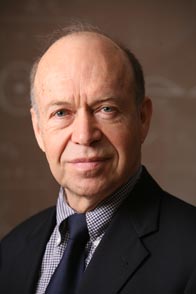Scientists were warning about the dangers of climate change even before America discovered and used oil on an industrial scale. Here, in the second of three posts, we see how in the 1980s it appeared politicians would rise to the challenges it presents…
James Hansen was the first scientist to detect the current rise in global temperatures, but he certainly was not the first to understand the effect greenhouse gases have on global temperatures.
It was well understood for centuries that without carbon dioxide, the Earth would be too cold to maintain life as we know it. Warnings about climate change in fact predate the discovery of oil.
In 1824, Joseph Fourier discovered the “greenhouse effect” and explained how heat from the sun is trapped in the Earth’s atmosphere. In 1861, the Irish scientist John Tyndall confirmed different gases in the atmosphere—such as carbon dioxide—could change the temperature of the planet.
It was forty years later, on 10 January 1901, that brothers Al and Curt Hammil used a rotary drill for the first time and sunk an oil well that produced a hundred thousand barrels a day—“the combined production of every other well on Earth”.
Guy Callender, a British scientist, came to the conclusion in 1961 that a contemporary rise in global temperatures was due to carbon dioxide, but his faith in the theory cooled when in 1963 Britain experienced the coldest winter in more than two centuries.
Worrier-in-chief
The terrible error of believing that even a decade of exceptionally cold weather undermined the theory of climate change would be made again, not least by Lawson and his Global Warming Policy Foundation (GWPF).
HOW CLIMATE SCIENCE BECAME A POLITICAL ISSUE
Part 1: James Hansen: How Climate Change Became Political
Part 2: James Hansen: I Thought There Would Be a Rational Response
Part 3: How Free Market Thatcher First Called for Climate Action
Next Week: Monckton’s Odd Claim He Inspired Thatcher’s Climate Call
Pioneering climate science was initially welcomed and well understood in the White House. President Jimmy Carter, known as the “worrier-in-chief”, ordered his staff to draft the Global 2000 Report, which drew together all the potential risks to person and nation, which in turn posed the question about the sensitivity of the Earth’s temperatures to rising greenhouse gases.
Carter installed 32 solar panels in the White House in June 1979—at the height of the Middle Eastern oil embargo.
He said the solar heater might become “a small part of one of the greatest and most exciting adventures ever undertaken by the American people, harnessing the power of the sun to enrich our lives as we move away from our crippling dependence on foreign oil.”
Hansen would reflect years later: “Considering that Carter initiated and approved projects aimed at extracting oil and gas from coal, as well as cooking the Rocky Mountains to squeeze oil from tar shale, he had very good reason to worry.”
Exterminate all life
“These projects, if they had been carried to full fruition and spread to other nations, had the potential to exterminate all life on Earth.”
The term “global warming” was first used in a scientific paper by Hansen in 1981 when he published his article “Climate Impact of Increasing Atmospheric Carbon Dioxide” in the journal Science.
He told the author: “That was the point where it was clear that this was going to happen in our lifetime.”
“I remember telling Andy Lassis, my colleague at Iowa University, that wow, by the end of this century we will definitely be able to see the effects that humans are having on this planet. And that was an eye opener.”
Hansen at first struggled to get the article published. The scientist resorted to cutting out graphs showing how coal, oil and gas burning correlated with the rise in carbon dioxide in the atmosphere.
The 1981 journal article prompted dire headlines on the front page of the New York Times. Hansen suffered no fear or trepidation back then.
A rational response
“We had coal phase-out scenarios. I wasn’t thinking, ‘oh, this is really gonna happen out in the twenty-first century’, because I thought there would be a rational response.”
“There has not been: it’s as if we didn’t know. We might as well not know. Our fossil fuel use wouldn’t be much different. By and large, the emissions have just continued to accelerate.”
Everything changed when Ronald Reagan, an avid reader of Hayek and exponent of the free markets, was elected president in 1981 and immediately ordered that the White House solar panels were to be removed.
Under the new leader of the free world, the department of energy cancelling funding to Hansen’s department at NASA.
“Other researchers were told their funding would be terminated if they used climate models developed in Hansen’s lab, and some of his researchers were laid off as other funding was arranged,” according to environmental author Mark Lynas.
“The pressure was so intense that Hansen sometimes asked to testify as a private citizen rather than as a federal employee.”
Climate change would be kept off the American policy agenda for a further seven years. After Hansen told the Senate in 1988 that America was experiencing its hottest year in modern human history, he was subjected to years of censorship.
Hansen, by demonstrating that climate change was already taking place, forced the issue. But, surprisingly, it was Reagan’s closest political ally and fellow advocate of the free market who would finally put the global crisis of climate change onto the international agenda.
Subscribe to our newsletter
Stay up to date with DeSmog news and alerts






